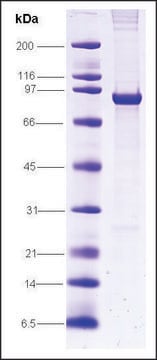C-12530
Human Skeletal Muscle Cells (SkMC)
500,000 cryopreserved cells
Synonym(e):
SkMC cells
Anmeldenzur Ansicht organisationsspezifischer und vertraglich vereinbarter Preise
Alle Fotos(1)
About This Item
UNSPSC-Code:
41106514
NACRES:
NA.81
Empfohlene Produkte
Biologische Quelle
human skeletal muscle
Verpackung
pkg of 500,000 cells
Morphologie
(skeletal muscle)
Methode(n)
cell culture | mammalian: suitable
Versandbedingung
dry ice
Lagertemp.
−196°C
Allgemeine Beschreibung
Lot specific orders are not able to be placed through the web. Contact your local sales rep for more details.
Ursprung der Zelllinie
Muscle
Anwendung
Primary Human Skeletal Muscle Cells (SkMC) are isolated from different skeletal muscles (e.g. Musculus pectoralis major) from adult single donors (lot specific source information is available on request) and are provided in a cryopreserved format. They are positive for sarcomeric myosin and negative for smooth muscle specific α-actin.New skeletal muscle cells originate from quiescent satellite cells, which are located in the muscle fibers between the basal lamina and the sarcolemma. Quiescent satellite cells are activated by stimuli such as muscle damage. After activation, the cells, now called myoblasts, start to proliferate and fuse with damaged muscle fibers or with one another forming new myotubes.SkMC are optimal for in vitro muscle studies. They proliferate very well in the mitogen-rich PromoCell Skeletal Muscle Cell Growth Medium. Fusion to myotubes with typical multinucleated syncytia can be induced by using the PromoCell Skeletal Muscle Cell Differentiation Medium.
Qualität
Rigid quality control tests are performed for each lot of Human Skeletal Muscle Cells. They are tested for cell morphology, adherence rate, and cell viability. Immunohistochemical tests for cell-type specific markers are carried out for each lot. Growth performance is tested through multiple passages up to 15 population doublings (PD) under culture conditions without antibiotics and antimycotics. Furthermore, the capacity to differentiate into multinucleated syncytia is routinely checked for each lot. In addition, all cells have been tested for the absence of HIV-1, HIV-2, HBV, HCV, HTLV-1, HTLV-2 and microbial contaminants (fungi, bacteria, and mycoplasma).
Warnhinweis
Although tested negative for HIV-1, HIV-2, HBV, HCV, HTLV-1 and HTLV-2, the cells – like all products of human origin – should be handled as potentially infectious. No test procedure can completely guarantee the absence of infectious agents.
Subkultur-Routine
Click here for more information.
Sonstige Hinweise
Recommended Plating Density: 3500 - 7000 cells per cm2Passage After Thawing: P2Tested Markers: Sarcomeric myosin positiveDifferentiation capacity to multinucleate syncytia testedGuaranteed population doublings: >15
Haftungsausschluss
RESEARCH USE ONLY. This product is regulated in France when intended to be used for scientific purposes, including for import and export activities (Article L 1211-1 paragraph 2 of the Public Health Code). The purchaser (i.e. enduser) is required to obtain an import authorization from the France Ministry of Research referred in the Article L1245-5-1 II. of Public Health Code. By ordering this product, you are confirming that you have obtained the proper import authorization.
Lagerklassenschlüssel
12 - Non Combustible Liquids
WGK
WGK 1
Flammpunkt (°F)
Not applicable
Flammpunkt (°C)
Not applicable
Analysenzertifikate (COA)
Suchen Sie nach Analysenzertifikate (COA), indem Sie die Lot-/Chargennummer des Produkts eingeben. Lot- und Chargennummern sind auf dem Produktetikett hinter den Wörtern ‘Lot’ oder ‘Batch’ (Lot oder Charge) zu finden.
Besitzen Sie dieses Produkt bereits?
In der Dokumentenbibliothek finden Sie die Dokumentation zu den Produkten, die Sie kürzlich erworben haben.
Unser Team von Wissenschaftlern verfügt über Erfahrung in allen Forschungsbereichen einschließlich Life Science, Materialwissenschaften, chemischer Synthese, Chromatographie, Analytik und vielen mehr..
Setzen Sie sich mit dem technischen Dienst in Verbindung.






